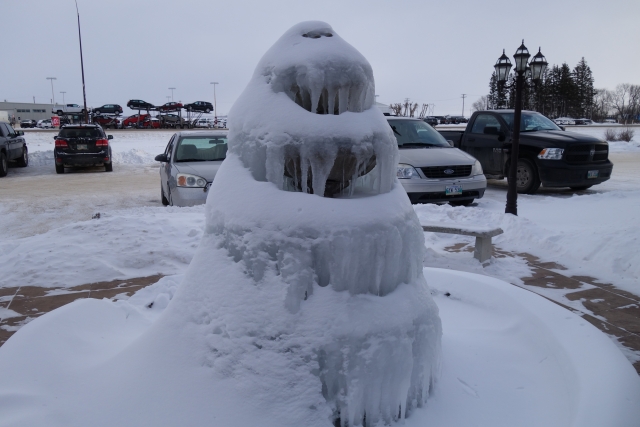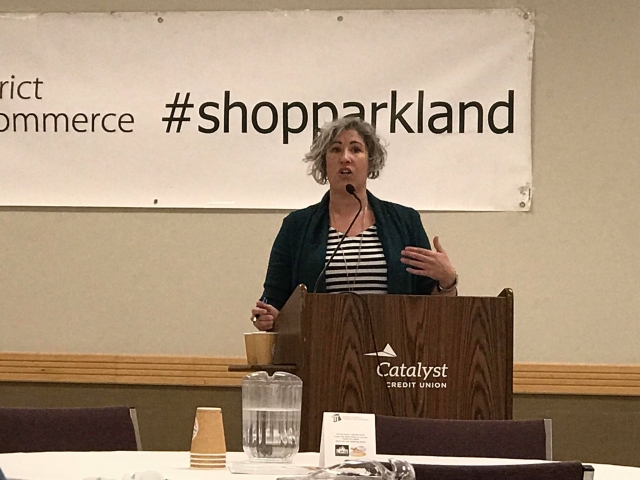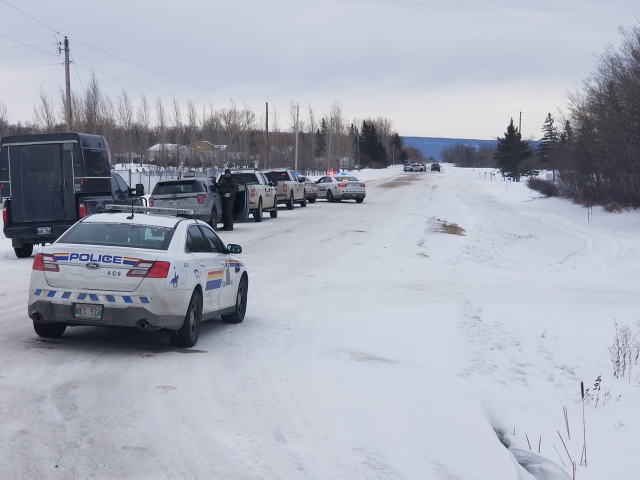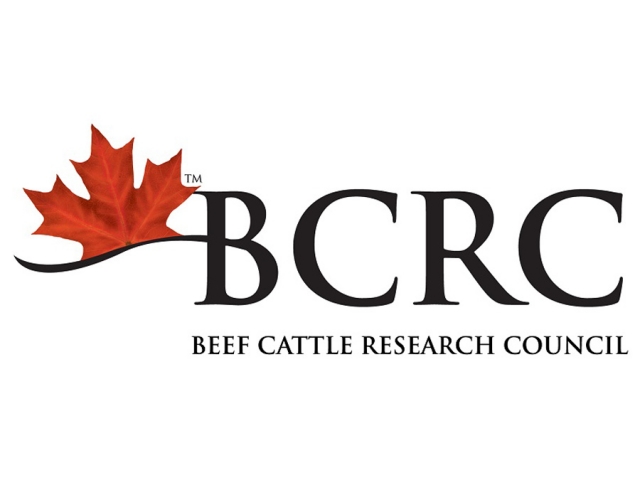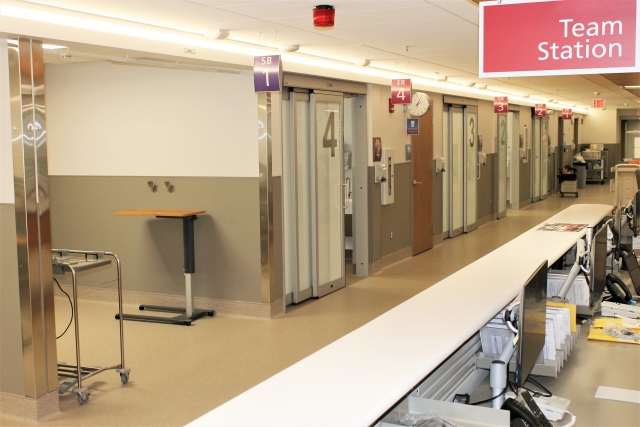 NewsNow
NewsNow
Wind chills in or around the -40 to -45 range along with a plunging temperature are here, holding true an extreme cold warning from Environment Canada that was issued yesterday.
An arctic airmass is making its way south and is expected to bring northerly wind gusts of up to 60 km/hr with it.
The warning is in effect for the municipalities of Dauphin; Russell-Binscarth; Roblin; Winnipegosis; Gilbert Plains; Grandview; Mossey River and the rural municipalities of Lakeshore and Riding Mountain West.
Things are expected to get better this afternoon.
Click here for the full warning.
- Details
- Contributed by Alec Woolston
Today the Dauphin Chamber held their second lunch series.
The series gave tips on how to become aware of and discuss problems with how people function in the workplace.
A presentation was given by Nicole Chappellaz on how to handle these types of issues.
“We talked about HR practices in the workplace, so implementing policies that are going to help prevent any issues before they come up. We also talked about when they do come up, how to spot the signs. When to recognize when you may need help with your HR issues. Especially in small to medium size businesses where they don`t have a designated HR person. ``
Details on the future breakfast and lunch events are posted on the Dauphin Chamber's website.
- Details
- Contributed by Tess Kovach
Keystone Agricultural Producers has announced a partnership with the Canadian Young Farmers Forum to present the Manitoba Young Farmers Conference that will take place on March 5th at the Victoria Inn Hotel in Winnipeg.
The event is part of KAP's focus on supporting young farmers to ensure the sustainability of the agricultural sector.
The event will focus on strategies to improve on-farm efficiency. Speakers will demonstrate how analyzing data and using regenerative production practices can lower costs and improve profitability.
KAP program manager, Thea Green said that young farmers need the tools and strategies to remain competitive in the global marketplace.
“We know that creating efficiencies on the farm is a top priority for our young farmers, and practical learning opportunities like this event will put Manitoba young farmers at a distinct advantage over their peers,” said Green.
KAP aims to address issues that have been discussed at multiple focus group consultations through the conference.
The event will end with a panel of Manitoban farmers who will share the strategies that have worked best for them.
The cost to attend the conference is $50. Lunch and two coffee breaks will be included.
To register and see the full agenda visit www.kap.ca/young-farmers-conference
- Details
- Contributed by Josh Sigurdson
UPDATE:
The Dauphin RCMP received a report, just after 2 this morning, of a male at a residence in the Eclipse area, located east of Dauphin, who was armed with a weapon and that a female was still inside the residence with possible injuries.
The RCMP’s Negotiation team and Emergency Response Team were contacted and deployed to the scene.
There was no threat to public safety.
Around 10:43 am, the 29-year-old male exited the residence and surrendered to police. He was taken into custody without incident.
The 21-year-old female was transported to the hospital with non-life threatening injuries.
The accused remains in police custody at this time.
The Dauphin RCMP will continue to investigate.
---------------------------------------------------------------------------------------------------------------------------------------------------------------
The RCMP now have a suspect in custody after they were called out to the Eclipse area early this morning.
We'll have more information when it becomes available.
---------------------------------------------------------------------------------------------------------------------------------------------------------------
Early this morning at 2:11, the RCMP were called out to the Eclipse area, for a female that was possibly injured.
RCMP say it's an armed and barricaded situation.
The RCMP Negotiation team and Emergency Response Team are on scene.
The RCMP ask that the public stays away from the area.
We’ll update you as information becomes available.
- Details
- Contributed by Isaac Wihak
Manitoba's major political parties cut their spending in the last election campaign, despite having higher donation and spending limits.
The Progressive Conservatives spent $1.27 million on their central campaign for the Sept. 10 vote -- down $260,000 from the 2016 election
The parties spending limit was $1.9 million.
The New Democrat and Liberal central campaigns spent less than half of what they did in 2016 -- $547,000 and $129,000, respectively.
Political analyst Paul Thomas said one reason for the lower spending was Premier Brian Pallister's decision to call the election a year ahead of schedule.
Thomas added that the Tories had been consistently ahead in the polls and likely did not feel the need to break the bank in order to get re-elected.
- Details
- Contributed by Tess Kovach
If you look into the night sky this month, you will see our planetary neighbour- Venus.
Scott Young, manager of the Manitoba Museum’s Planetarium and Science Gallery says the planet will appear as the brightest star in the sky.
“If you outside just after dark, and you see a really, really bright star in the southwest, that’s actually Venus,” said Young. “It’s reaching its highest and brightest point over the next little while throughout February.”
Young adds that Venus is so bright that it may become visible just after the sun goes down.
Another thing that sky watchers can look forward to this month is Mercury also being visible.
Young says that it may be harder to see Mercury, as it will closer to the horizon.
- Details
- Contributed by Josh Sigurdson
Dr. Reynold Bergen spoke about some of the positive research being done for the beef sector at the Manitoba Beef Producers’ AGM last week in Brandon.
Dr. Bergen is the Science Director for the Beef Cattle Research Council. The BCRC uses federal check-off dollars to conduct research on efficiency on the farm as well as beef quality.
Bergen’s speech focused on the research being done about the environmental impact of cattle farming.
“We funded research to look at how Canada’s environmental footprint has changed over the last 30 years,” said Bergen. “What we found was that methane produced per pound of beef has dropped by 15 percent, and water use has dropped by 17 percent, and ammonia per pound of beef has dropped by 20 percent.”
Bergen says these are all positive environmental stories that need to be shared with the public.
Last August, the United Nations put out an article saying that people should eat less beef because of the industry's impact on Climate Change. The research done by Bergen and the BCRC suggests that the UN article isn’t all that correct. The research that the BCRC has conducted has recently gained national attention through McDonalds Canada, who based an entire campaign on environmental research.
“The good news about the environmental impact of Canadian beef, and how it has improved, reached an awful lot of people,” said Bergen. “That was all work that happened because beef producers were willing to support some research.”
While public trust in the beef sector has improved recently, Bergen says there is still a lot of work that needs to be done.
Some projects being funded by the BCRC are focusing on not only how the beef sector cuts down the negatives around climate change, but around the positives that the sector brings to the table. Those positives include carbon sequestration –the practice of capturing carbon in the soil, how grazing preserves the grassland ecosystems, which in turn maintains habitat for wildlife.
Bergen urges people to look at the correct information about the beef sector, instead of believing everything shared on social media. Some of the websites you can look at including the BCRC’s website, the Canadian Roundtable for Sustainable Beef’s website, or just go to an open farm day.
- Details
- Contributed by Josh Sigurdson
It’s been just over a year since the opening of the MRI at the Dauphin Hospital.
About 230 patients have used the MRI monthly since December 2018 when it was opened. That adds up to around 3220 MRI uses in Dauphin.
Leanne Treloar, Director of Diagnostic Imaging with Shared Health for the Prairie Mountain region, says the MRI reduced wait times everywhere.
“It allowed us to build up the capacity within Prairie Mountain Health, as well as across the province, to meet the demand for MRIs. We initially, when we started with the Dauphin MRI we moved some patients that were scheduled in Brandon that were from the Parkland area, and we got those patients scanned in Dauphin so they didn’t have to travel.
Treloar says the Dauphin MRI has been tremendous.
“Everyone is just so pleased that they don’t have to travel to Brandon or elsewhere to have their MRI scans done. I think it’s been tremendous, the positive feedback from the patients themselves, it’s been great. The staff there think it’s, just, such a benefit that they don’t have to travel.”
There are some scans the Dauphin MRI doesn’t do, such as specialty exams, which includes breast MRIs. Patients that require those exams still have to travel.
- Details
- Contributed by Isaac Wihak
15 Manitobans have died from the flu since September.
The latest numbers released by Manitoba Health show that 138 people tested positive for the flu during the week of January 26th to February 1st.
Manitoba Health says flu activity has been high compared to last flu season, with over 181 people visiting hospitals last week for respiratory issues.
Provincial labs have confirmed 552 cases of influenza A, and 590 cases of influenza B since last September. With most of those cases hitting young people the hardest.
The province the best way to protect yourself from the flu is to get the flu shot.
- Details
- Contributed by Josh Sigurdson
It’s been 6 and a half months since the move into the new emergency department at the Dauphin Hospital. In that time the staff and community have been able to adjust to the changes.
One of the new changes was the addition of the ambulance bay.
Curt Gullett, director of acute care at the Dauphin Hospital, says the enclosed ambulance bay improved delivery methods.
“For EMS and for the clients, having them not be exposed to the extreme cold environments during their offload, so certainly been a benefit to the clients with a climate controlled EMS bay going right into the new emerge department.”
The transition into the new emergency department was successful. Originally, there were some challenges including clients learning which doors to enter through. The cul de sac at the back of the hospital also took some getting used to with people needing to learn how to maneuver through the area and make the drop offs.
Gullet says the support from the public is appreciated and it’s made the transition very smooth.
“We’ve had nothing but good comments from our public, now that they’re in the new emerge department. Of course waiting room space is much larger, it’s a very open concept and a very lightened concept with the glass window front. So they’re very happy with that. Again, all in one service, they’re coming in, being able to be triaged right there at the desk by nursing staff, and then appropriate waiting space to move in to the new ER space.”
From a staff perspective, Gullett says the space is a lot larger than before, and there are dedicated rooms with supplies available in each room for different situations. In that sense, the upgrades have made the staff’s jobs easier.
Another upgrade that has assisted them is the EDIS system, which is a computer program which allows for triage to happen and then gets displayed in the ER room. Gullet says it’s a better communication system within the department that keeps track of patients and their updates.
Overall, Gullett says the upgrades have lived up to expectations.
“We certainly appreciate the space, the new modern look, it’s been appreciated by both staff, and clients. It makes the facility, it’s made a huge improvement to not only the architectural structure of the design, but it also adds to meeting some of the guidelines as far as our Sinclair Inquest, and those type of things for improvements.”
- Details
- Contributed by Isaac Wihak
The 41st Manitoba Beef Producers Annual General Meeting focused on the challenges of 2019 while focusing on the positives ahead.
The meeting started off with presentations on what national beef councils are doing to help improve public trust in the beef sector.
Over 40 resolutions were brought forward for debate.
Most of the resolutions focused on the changes to Crown Land leases in the province, as well costs borne on producers from the carbon tax.
The theme of the meeting was ‘Where Beef Fits In An Evolving Marketplace’ and many of the presentations focused on how beef can compete with things like Beyond Meat, also on how the outbreak of African Swine Fever in China will leave a gap in the protein market that beef may be able to fill.
After lengthy debates on the resolutions, it was time for producers to sit back and relax at the banquet.
At the President’s Banquet, Provincial Ag Minister Blaine Pedersen brought greetings to the group and also announced some exciting things for beef producers. Pedersen announced that the government will be looking at allowing producers to buy their Crown Land leases and that they have partnered with MBP to launch a project to help curb wildlife predation.
Tune into the Noon Ag Show next week for more coverage on the MBP AGM.
- Details
- Contributed by Josh Sigurdson

